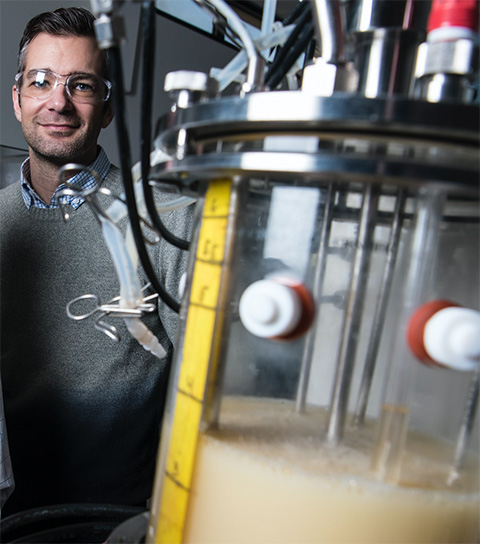$10 Million Sparks Research To Reduce Risks of Promising Bioengineered Organisms
Two awards totaling nearly $10 million from the U.S. Department of Energy's Office of Science Biological and Environmental Research (BER) program will support two research projects at the National Renewable Energy Laboratory (NREL) and partner laboratories that aim to analyze and reduce biosecurity risks of promising bioengineered organisms.

Genetically modified organisms have the potential to increase the sustainability and affordability of biofuels, bioplastics, and other advanced biotechnologies. But to wield these benefits safely, bioengineers need a clear understanding of environmental risks—and how to mitigate them—before making targeted changes to the genes of microbes or plants.
Working under BER’s Secure Biosystems Design Program, NREL’s two projects will provide the fundamental research to meet that need, investigating the basic machinery of microbes to give engineers a roadmap for designing secure biosystems.
“This work is vital for helping industries incorporate safety and control strategies into their technologies by creating a new understanding of the cellular mechanisms that can be exploited for biocontainment,” said Paul King, the acting center director for NREL’s Biosciences Center. “NREL’s close partnership with the University of Colorado-Boulder will provide many advantages by enabling growth of collaborative research between world-class institutions, with access to the expertise and technical capabilities necessary for a strong scientific program.”
NREL researchers leading both projects, Michael Guarnieri and Carrie Eckert, hold joint appointments with the University of Colorado-Boulder through the Renewable and Sustainable Energy Institute, which takes a multidisciplinary, multi-institutional approach to solving complex energy problems. Drawing from the capabilities of both institutions, the projects will add to a body of knowledge on creating biosystems that nourish the growing U.S. bioeconomy while safeguarding the health of natural and engineered ecosystems and organisms.
Researchers in NREL’s first project are focusing on predicting and controlling the biosecurity risks of bioengineered organisms that may be used in advanced industrial applications. To do this, they will develop a robust platform to help engineers design, generate, and analyze biological containment strategies. Ultimately, the work will result in an extensive library of microbial strains, biocontainment modules, and testing platforms, serving as a guide for creating secure biosystems for an array of agriculture and bioenergy applications.
Secure Ecosystem Engineering and Design (SEED)
In the second focus area, a joint project with Oak Ridge National Laboratory, researchers will study the biotic and abiotic processes that drive how microbes establish, spread, and impact ecosystems. Scientists think that improving our understanding of these factors will lead to innovative bioengineering approaches that can boost the productivity of the growing bioeconomy. The SEED team will develop cutting-edge tools and genomic resources that guide risk assessment and lend new countermeasures against unwanted microbial invasions—a step toward more resilient and secure forests and crops.
Learn more about NREL’s bioenergy research.
Last Updated May 28, 2025
